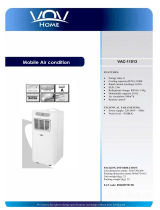
Safety precautions
Installing the unit
IMPORTANT: When installing the unit, always remember to connect rst the refrigerant tubes, then the electrical lines. Always
disassemble the electric lines before the refrigerant tubes.
f Upon receipt, inspect the product to verify that it has not been damaged during transport. If the product appears
damaged, DO NOT INSTALL it and immediately report the damage to the carrier or retailer (if the installer or the
authorized technician has collected the material from the retailer.)
f After completing the installation, always carry out a functional test and provide the instructions on how to operate the air
conditioner to the user.
f Do not use the air conditioner in environments with hazardous substances or close to equipment that release free ames
to avoid the occurrence of res, explosions or injuries.
f Our units should be installed in compliance with the spaces shown in the installation manual, to ensure accessibility from
both sides and allow repairs or maintenance operations to be carried out. The unit’s components should be accessible
and easy to disassemble without endangering people and objects.
f For this reason, when provisions of the installation manual are not complied with, the cost required to access and repair
the units (in SAFETY CONDITIONS, as set out in prevailing regulations) with harnesses, ladders, scaolding or any other
elevation system will NOT be considered part of the warranty and will be charged to the end customer.
Power supply line, fuse or circuit breaker
f Always make sure that the power supply is compliant with current safety standards. Always install the air conditioner in
compliance with current local safety standards.
f Always verify that a suitable grounding connection is available.
f Verify that the voltage and frequency of the power supply comply with the specications and that the installed power is
sucient to ensure the operation of any other domestic appliance connected to the same electric lines.
f Always verify that the cut-o and protection switches are suitably dimensioned.
f Verify that the air conditioner is connected to the power supply in accordance with the instructions provided in the
wiring diagram included in the manual.
f Always verify that electric connections (cable entry, section of leads, protections…) are compliant with the electric
specications and with the instructions provided in the wiring scheme. Always verify that all connections comply with
the standards applicable to the installation of air conditioners.
f Devices disconnected from the power supply should be completely disconnected in the condition of overvoltage
category.
f Be sure not to perform power cable modication, extension wiring, and multiple wire connection.
- It may cause electric shock or re due to poor connection, poor insulation, or current limit override.
- When extension wiring is required due to power line damage, refer to "How to connect your extended power cables" in
the installation manual.
ENGLISH-4
zzmylzoThpyGk|j{T{yptW[]Z`hTW[luUGGG[ YWX]TXWTW[GGG㝘䟸G\aXXaX_





















